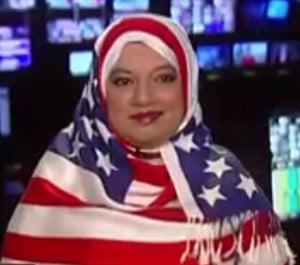Last week, as Halloween approached, searching for Halloween costumes online was interesting. Once more, like every year after 9/11, I was faced with the issue of hijabs, niqabs and burqas as Halloween attire. As we’ve previously discussed on MMW, hijabs, niqabs, burqas and the like are not okay as Halloween costumes. More generally, cultural appropriation is not okay, even (especially) on Halloween.
Last week, Dr. Faheem Younus wrote an article titled “Hijab is Not a Halloween Costume.” Dr. Younus is not the only concerned Muslim who has asked fellow Westerners to respect the meaning that female Muslim garments have for Muslim practitioners. A number of concerned Muslims have challenged the issue of niqab and burqas as costumes, in many instances, on the grounds of Islamophobia.
The article gives us an overview of why hijab, specifically, should not be considered as a costume and it makes an interesting point on the fact that the issue of hijab as costume is not unique to Halloween. Some people seem to think of the garment as costume-like attire year round (such as some Disney’s executives).
Nonetheless, in his article, there is a phrase that caught my attention. Dr. Younus describes that while at a paediatrician’s office, his wife was pointed at by a kid who thought her “costume” was “cool.” Fortunately, he says, the kid’s mother managed to explain that a hijab is not a costume, but a religious dress. The interesting part comes when Dr. Younus expresses: “Now, that was truly American.”
Dr. Younus’ statement clearly shows the fact that discussions on hijab, niqab and burqas are not only issues of cultural appropriation but also of patriotic pride. Whether respect for women who wear the garment is “truly American” or not seems to be debatable, as Dr. Younus’ statement is contested by the other side of the spectrum.
If one types “burka” and “Halloween” in a search engine, one can see a number of websites that feature hateful content against Islam and what they consider to be its symbols (more commonly women’s clothing). In this case, they make exactly the opposite argument as Dr. Younus: that facial coverings are not only the symbol of “evil” Islam, but also a threat to American patriotic values. Acceptance of these garments implies the degradation of “American culture” and the rejection of freedom. Thus, in this line of thinking, a burqa is indeed an appropriate Halloween costume because it should not be an acceptable every-day attire.
Some of us have seen children and adults dressed in burqas and niqabs on Halloween. Yet these discussions on “Islamic” attire have become less about the cultural appropriation of symbols and more about issues of nationalism and patriotism. Such discussions on Muslim women’s clothing are being used to determine whether or not respect for these symbols and specific cultures is, or should be, patriotic.
Although articles like Dr. Younus’ may aspire to open up the floor for respectful and conscious debates on religious forms of dress and their meaning for religious practitioners, we continue to contest Islamophobia (and Westernization, on the other hand) through Muslim women and their attire (either “properly Islamic” or “Westernized”).
Muslim women continue to be equated with the nation in either side of the continuum. One side wants to show that being “truly American” is to respect women’s head and face coverings. The other one uses Muslim women’s images to evoke fear and appeal to the “Islamization of America.” Both of these sides become part of a dynamic in which hijab, niqab and burqa become the center of nationalist feelings.











